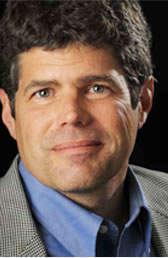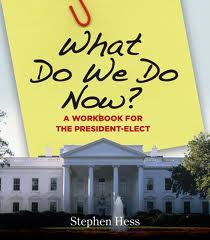 When Jonathan Miller told me about his idea of starting a website titled The Recovering Politician, I thought it was a clever concept—-a partly tongue-in-cheek, partly insightful look at life after elective office. There is the famous last scene in the film The Candidate where Robert Redford’s character, a charismatic underdog running for the US Senate, pulls out a narrow upset against an entrenched incumbent. Just before his acceptance speech he ducks into a small room to avoid the throng of supporters cheering him on. He wants a moment alone with his campaign manager whose sole purpose in life is to win political campaigns. The Candidate, looking perplexed, looks up and solemnly asks, “What do we do now?” (Click on Redford’s mug to view the scene.)
When Jonathan Miller told me about his idea of starting a website titled The Recovering Politician, I thought it was a clever concept—-a partly tongue-in-cheek, partly insightful look at life after elective office. There is the famous last scene in the film The Candidate where Robert Redford’s character, a charismatic underdog running for the US Senate, pulls out a narrow upset against an entrenched incumbent. Just before his acceptance speech he ducks into a small room to avoid the throng of supporters cheering him on. He wants a moment alone with his campaign manager whose sole purpose in life is to win political campaigns. The Candidate, looking perplexed, looks up and solemnly asks, “What do we do now?” (Click on Redford’s mug to view the scene.)
It’s an “Aha” moment for the audience that what primarily drives some of our political candidates may not be the privilege of toiling over mundane public policy day in and day out, but rather to “win” some kind of overdramatized contest and the sense of accomplishment that comes with it. (Think of the hit TV series the Apprentice that follows job applicants for months going through a variety of ordeals until one is finally told by Donald Trump, “You’re hired.” We never find out—or care, for that matter—how the winner actually performs on the job.) Political candidates often get similar treatment from voters and the media. We treat business and politics as part sport and part theater.
But The Recovering Politician asks a slightly different and more personally poignant question: When one’s political yearnings have been squelched, dashed, sated, or otherwise drummed out of him or her, doesn’t every ex-politician go into that same small room ––this time alone—and ask, “Now what do I do?” The answer, of course, is yes —and the choices ex-politicos make to create meaning in their lives post-politics is more interesting and hopeful than one might think. The Recovering Politician blog explores this area in hopes of humoring and humanizing the reader—and the subjects.
The metaphor of “recovery” for an ex-politician can be fitting. Recovery in addiction jargon connotes a “bottoming out” from debilitating excess that is followed by a rebirth that ultimately leads to a deeper, more wholesome, and more meaningful life. So, there are parallels. Political aspirations aren’t really an addiction, of course, but they can become an all-consuming obsession that can warp the priorities and perceptions of the individual harboring them and at times mirror aspects of real addiction.
Winning a political race is a powerful form of personal affirmation. Add to that the rush of crowds cheering you on, of striving publicly for lofty ideals, of battling societal wrongs, of pursuing the hero role, of putting it all on the line —these are heady pursuits that must rival on some chemical level a potent physical high. And it’s a high that many may want to experience more than once —or twice, or—well, you get the idea.
And since most people who enter politics rarely fall within the middle range on any bell curve measuring normalcy in personality, isn’t it fair to wonder if a small segment of society isn’t predisposed to the potent allure of a politically laced buzz? Of Jonesing for the next race, the next speech, the next press conference, the next burst of applause?
Personally, I think the answer is yes. And I reluctantly admit that I may be one of them. I’ve spent my life around politics and elected officials and have been an office holder myself for nearly a decade. My father won and lost races for governor and my grandfather ran for a variety of state and federal public offices —some 22 races according to family lore (losing more than he won).
So, are you one of these people? I’ve devised a test to help you determine just that. These questions are drawn from a variety of recovery programs for actual addictions coupled with my personal experience and observations—and my overactive imagination. Answer them honestly. You may be a one of us. If so, you are not alone. And remember: Recovery begins by admitting you have a problem.
1) Have you ever slept in a separate bedroom from your spouse because you had an overheated argument about healthcare policy?
2) Have you ever planned a family vacation in conjunction with the Republican or Democratic National Convention and pretended it was a coincidence?
3) Do you struggle to understand what “normal” is and seek to find out through polling data?
4) Have you ever worked in a political campaign because you secretly wanted the Rolodex of the candidate to use for your future campaigns? Give yourself two points if as a candidate you refuse to hire volunteers you suspect just want your Rolodex for a future campaign of their own.
5) Have you ever had to apologize for insulting a loved one with a devastating line you heard a politician use against an opponent? Two points if you continued to use it anyway.
6) Have friends or family ever discouraged you from running for political office? Two points if your friends and family were seated in a circle around you and took turns reading the reasons you shouldn’t run for office again from a pre-written statement while a therapist moderated.
7) Do others sometimes drink to excess in your presence to make you and your political conversation more bearable?
8 ) Have you ever felt so emotionally hung over after a major political event that you needed to read from a high brow policy journal for an “eye opener” the morning after to get your bearings (“Hair of the dog”)?
9) Do you ever think about political strategy in the morning or while alone?
10) While holding public office, did you ever call your family together and ask if they’d like you to leave politics to spend more time with them and were told they were fine with you away from home and wanted to keep it like that?
11) Did you secretly cheer for Reese Witherspoon’s ruthless character, Tracy Flick, in the movie Election when she ran for student body president because you felt “Tracy deserves to win” and will know how to “get things done.”
12) Have you ever been in counseling while campaigning for public office? Two points if you solicited your therapist for a campaign contribution. Three points if your therapist refused to contribute to your campaign. Four points if your therapist made an unsolicited contribution to your opponent instead. Five points if your therapist was simultaneously treating your opponent as a patient and explained “I just felt he was making faster progress.”
13) Give yourself one point if you’ve read this far. Two points if you are using a pencil or pen.
14) Have you ever planned a “political comeback” strategy while still in the middle of current campaign?
15) Has a friend ever told you that she was going to support your opponent because, “I can vote for you next time you run for office”?
16) When contemplating the strain politics has placed on your marriage did you weigh considerations such as the growing demographic of divorced voters in your district or whether a divorce could help you seem more “real” and “connect better” with voters?
17) Are you hyper sensitive to personal criticism about your character and personality because you worry such comments could leak out to the public and end up being used against you in a political ad?
18) Have you ever been criticized on a political blog and anxiously awaited comments to the post hoping someone would defend you? Two points if you called a friend to comment on your behalf. Three points if you made anonymous comments defending yourself. Four points if you made anonymous comments basically agreeing with the critical post.
19) In your political profile when asked to list an inspirational movie did you put down Braveheart because you thought it would impress voters even though you slept through most of it and still don’t know why Mel Gibson was painted blue during the scene that woke you?
20) Has your campaign manager ever greeted you with the words, “Looks like somebody could use a hug.” Two points if you responded, “Yes, I sure could” and obliged. Three points if this has happened to you multiple times.
If you received one to five points, you may have an underlying political pathology that requires “bottoming out” before you can begin the road to recovery. You are considered “at risk.”
If you received six or more points, you are definitely in the right place. You have probably already bottomed out. But there is hope for you. Just not a lot of it. But keep reading anyway. We’re searching for success stories of recovery from politics.
And let’s face it, each day you are on this blog reading hopeful blog posts that’s one more day that you are at least not planning your next run for political office. That’s a start—for you and your loved ones. One day at a time.
Oh, and if you scored 23 points or higher and haven’t run for political office in over a year, please contact me. I’m looking for a sponsor.
And keep coming back.





















Leave a Reply